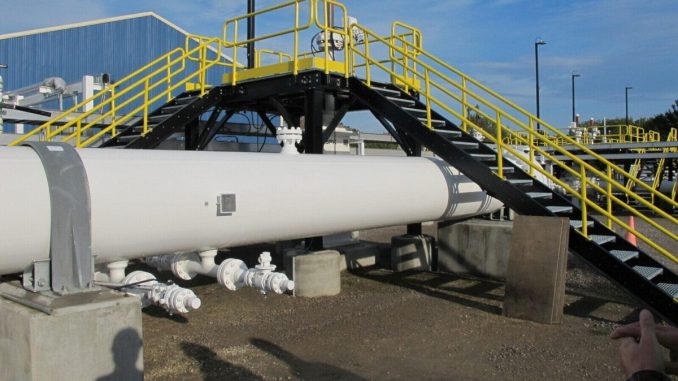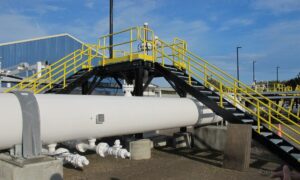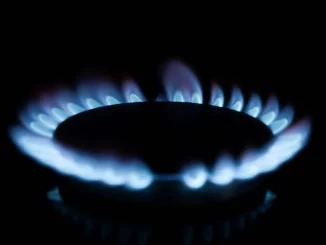

As Calgary-based Enbridge Inc. continues its legal battle with the state of Michigan over Line 5, a former Alberta oil executive says closure of the pipeline would choke one-fifth of Canada’s crude oil exports and upend supply chains for diesel and gasoline production on both sides of the Canada-U.S. border.
“They would do all kinds of things, shipping by rail, by truck and even ship to meet market need. But in my opinion there would be shortages for quite a bit of time,” Richard Masson, an executive fellow at the University of Calgary and chair of World Petroleum Council Canada, said in an interview.
“And we haven’t been able to build pipelines without delays and controversies for years, so there’s no real way to replace Line 5. What we need is that pipeline to keep running.”
While U.S. President Joe Biden’s cancellation of Keystone XL hurt Canada’s oilpatch, now the entire country’s energy security is vulnerable to the whims of Michigan Governor Rachel Whitmer. In attempting to fulfill a campaign promise, Whitmer is being challenged in the U.S. federal court by Enbridge to keep its easement over Line 5 through the Straits of Mackinac.
Last year, Whitmer announced that the 67-year-old easement permit for Line 5 would expire on May 12, 2021. She wants the pipeline shut down because of concerns about a potential spill in the Straits, which connects Lake Huron and Lake Michigan.
“We don’t have a bunch of spare pipelines sitting around, and shutting down Line 5 shuts down 20 percent of our ability to get crude to market, which would be a big impact for Alberta producers,” Masson said.
“But it would be a bigger impact for consumers because it’s 50 percent of the refined products that come in through the Ontario market. So closing this down would be a big deal.”
Enbridge has held permits since January to replace the portion traversing the bottom of the Mackinac Straits by burying the pipe in the lakebed.
The 1,038-kilometre line from Superior, Wisconsin, to Sarnia, Ontario, ships 540,000 barrels per day of crude and other petroleum products, including liquid natural gas to produce propane.
Enbridge says Line 5, which was built in 1953, has never leaked into the Straits of Mackinac. In July 2020, the company placed into service a new section of the Line 5 pipeline, replacing a segment that previously lay on the river bed with a new segment buried far below the St. Clair River, running between Sarnia, Ont., and Marysville, Michigan. It’s proposing a similar project for Mackinac.
Enbridge said in a statement just ahead of the May 12 deadline that it won’t stop operating the pipeline “unless we are ordered by a court or our regulator, which we view as highly unlikely.”
Former Liberal MP Dan McTeague, founder of Canadians for Affordable Energy and a former senior petroleum analyst at GasBuddy, said a Line 5 closure could spike gas prices “easily by as much as 50 cents a litre at the outset.”
Fuel shortages would follow, says McTeague. He predicts that Central Canada will see a protracted and far more serious replay of the recent panic-buying and lineups at gas stations in the eastern United States after hackers shut down the Colonial Pipeline in a cyberattack.
“It’s one of those things that would make for the perfect storm, be the sum of all fears, as the expression goes. It would unleash a significant avalanche of bad economic news,” McTeague told The Epoch Times.
“And so we’re waiting on a knife’s edge for the court decision based on jurisdiction, whether it’s a federal matter, whether it’s a state matter, and a continued pursuit by political activism in United States to close down pipelines, and Line 5 is very much in their sights.”
On May 11, the Canadian government intervened in the court case, noting that a shutdown would breach a Canada-U.S. agreement concerning transit pipelines that was signed in 1977, and stating that the case should be heard in U.S. federal court.
“A shutdown of Line 5 would cause certain, immediate and serious harm to several important public interests,” reads Canada’s brief, noting that “Central Canada and parts of the northern United States would lose relatively safe, efficient, and reliable access to fuel that is essential.”
According to the Canadian Energy Centre, an Alberta government-funded energy think tank, 55 percent of Michigan’s propane supply is reliant on Line 5, while refineries in Quebec, Ontario, Ohio, Michigan, and Pennsylvania receive 45 percent of their feedstock from the Enbridge line.
Masson said such a supply shortfall could not be addressed quickly on either side the border.
“Refineries that haven’t received crude oil by rail for the last 30 years don’t have a lot of rail and loading capacity sitting next to them,” he said. “So there would be no easy fix that could happen in a hurry because it takes time to build all that.”





Be the first to comment